Mastering Nutrition: A Comprehensive Guide to Healthy Eating
Published: March 9, 2024 6 mins read
Imagine waking up every morning feeling energized,
focused, and ready to conquer the day. Imagine a life free
from chronic diseases, mood swings, and constant fatigue.
Imagine a future where you save thousands of dollars on
healthcare costs.
Sound too good to be true? It’s not – it’s the reality that
healthy eating habits can provide.
Developing healthy eating habits are like tending to a
well-manicured garden. It requires consistent care and
attention, but the rewards are bountiful.
Just as a garden needs the right soil, water, and nutrients
to thrive, your body needs a balanced diet to function
optimally.
And just as a garden rewards the gardener with vibrant blooms
and luscious fruits, your body rewards you with vitality, energy, and well-being when you nourish it with the right foods.
Picture a vibrant rainbow on your plate, each color representing a different nutrient that your body needs to function at its best.
Variety and moderation are the secret ingredients to a balanced diet. No single food can provide all the nutrients your body needs, and overindulging in even the healthiest foods can tip the scales towards health problems.
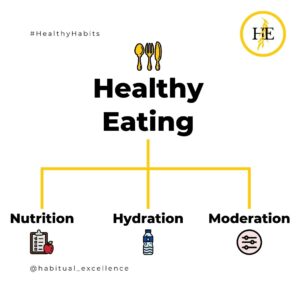
One of the easiest ways to ensure that you’re eating a healthy diet is to plan and prepare balanced meals. A balanced meal is one that includes all food groups in the right proportions.
A good rule of thumb is to fill half of your plate with fruits and vegetables, a quarter with whole grains, and a quarter with lean protein. This will ensure that your meal is nutritious and well-balanced.
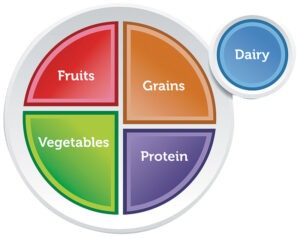
Nutrients are the stuff in food that our bodies need to work right. We get them from eating different kinds of foods. They help us grow, give us energy, and keep us healthy.
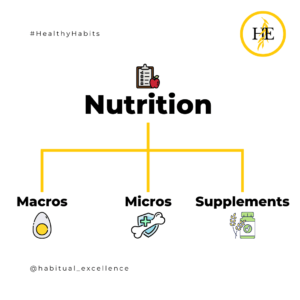
Macronutrients are the cornerstone of nutrition, fueling our bodies with energy and essential functions. Carbohydrates provide quick energy, proteins rebuild muscle tissue and support immune function, and fats store energy and aid cell growth.
For a balanced diet, aim for a mix of 45-65% carbohydrates, 10-35% protein, and 20-35% fats. Adjust these ratios based on your activity level, health goals, and dietary needs to maintain optimal health and vitality.
For example, if you’re highly active, you might need more carbohydrates for energy. Sedentary lifestyles may require fewer carbs and more protein for muscle maintenance. Are you aiming to lose weight, build muscle, or improve heart health? Weight loss might benefit from a lower carb intake, while muscle building requires more protein.
Micronutrients, the vital vitamins, minerals, and antioxidants, are the unsung heroes of our health.
They defend against disease, support growth, and maintain bodily functions. Found in colorful fruits, leafy veggies, nuts, and whole grains, they’re nature’s little life-savers.
While daily needs vary, a diverse diet generally covers your bases. A little goes a long way with these nutritional powerhouses!
Supplements are like extra help for your diet. They pack a punch with important nutrients that your body needs.
They’re great for when you’re not getting enough from food alone. They can help keep you healthy, but taking too much or mixing them with certain medicines can be risky.
Some popular ones are multivitamins for overall health, vitamin D for strong bones, and omega-3s for a healthy heart.
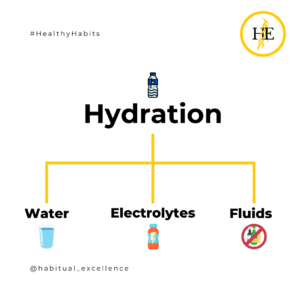
Water keeps you alive, helps your body work right, and keeps you from getting too hot or too cold.
Not drinking enough can make you tired and fuzzy-headed, but drinking too much can mess up your body’s salt levels.
Try to drink about 8 glasses of clean water a day, more if it’s hot or you’re active.
Electrolytes are minerals in your body that have an electric charge. They help balance the amount of water in your body, move nutrients into your cells, and waste out of them.
They also make sure your nerves, muscles, heart, and brain work the way they should. Losing too many electrolytes through sweat or illness can cause cramps, weakness, or confusion.
To keep levels steady, eat fruits and veggies, drink fluids with electrolytes like coconut water or sports drinks, especially when you’re sweating a lot or sick.
Fluids are any liquids that help keep you hydrated. They’re important because they help your body absorb nutrients and get rid of waste.
Different drinks have different effects: water is the best for staying hydrated, while juices provide vitamins but can have a lot of sugar.
Teas and coffees can be healthy in moderation, but too much can dehydrate you. Sodas and alcohol are usually not great choices—they can have lots of calories and make it harder for your body to hold onto water.
Stick to water and other healthy drinks most of the time to stay hydrated and healthy.
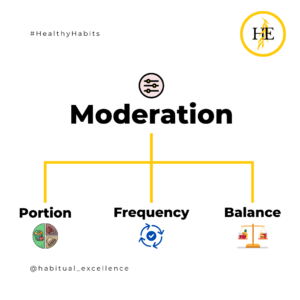
Portion size is key to managing calorie intake and weight. It’s influenced by hunger, fullness, and even plate size.
To control portions, use smaller dishes, measure food with cups or scales, and listen to your body’s hunger cues.
This helps prevent overeating and supports weight management.
Eating frequency shapes your metabolism and energy. Regular meals maintain steady blood sugar, while intermittent fasting may boost fat loss.
Grazing can prevent hunger but may lead to overeating. Tailor meal timing to your lifestyle for best results—active days may need more frequent fueling, while relaxed days may benefit from less.
Always align eating patterns with your body’s signals and health goals.
A balanced diet is the foundation of good health, ensuring you get the right mix of macronutrients, micronutrients, and fluids.
It’s about variety—eating a rainbow of foods to cover all nutrient bases, staying hydrated, and enjoying treats without overdoing it.
Follow dietary guidelines, like the food pyramid, to create meals that fuel your body and mind.
The saying “You are what you eat” means that the food you eat has a big effect on your health.
Eating foods that are full of nutrients can make you feel stronger, help you concentrate better, and make you happier. On the other hand, eating lots of unhealthy food can lead to many health problems.
Choosing to eat healthy food is a really important decision that can help you live a lively and energetic life.
